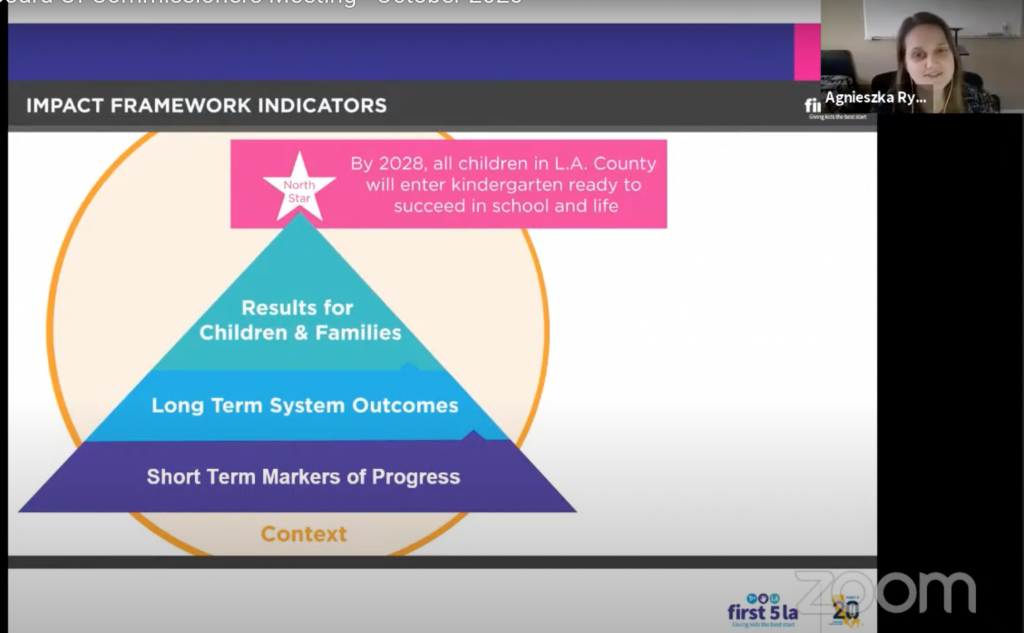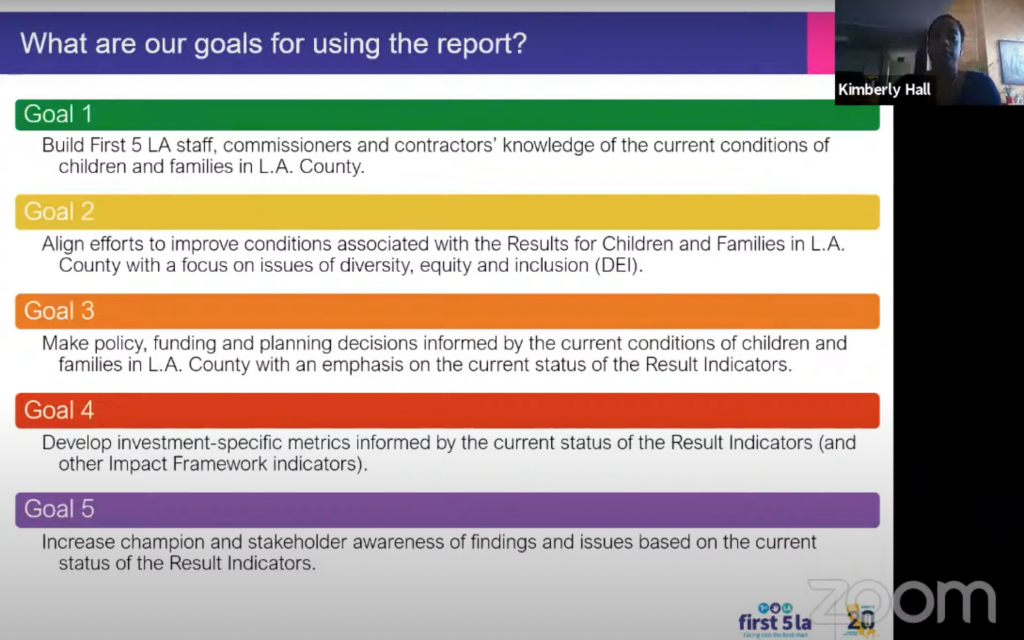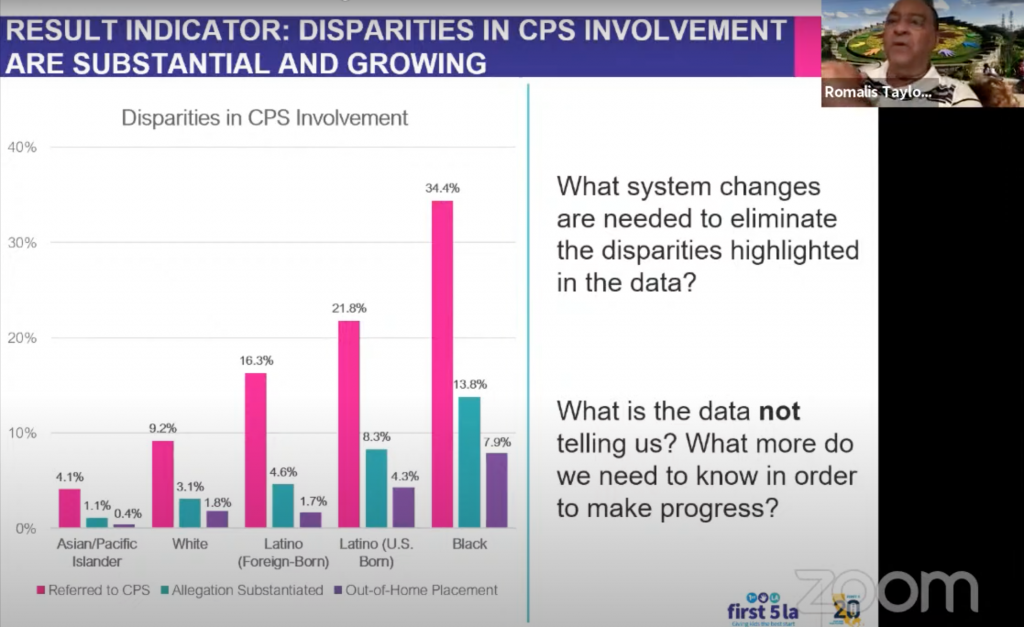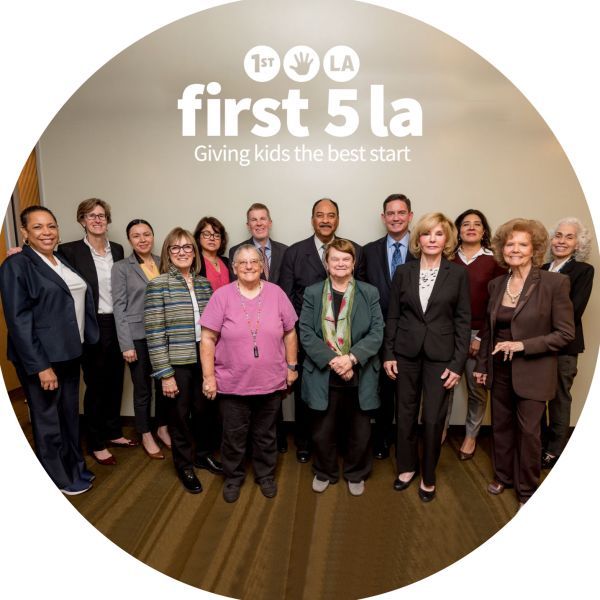The progress First 5 LA is making toward reaching its North Star goal — that all children in L.A. County will enter kindergarten ready to succeed at school and life — was the primary topic of discussion at the October 8 Board of Commission meeting, which was held virtually due to ongoing safety precautions related to the COVID-19 pandemic.
This theme was reflected in the content of two presentations that were brought to the Board. The first, “Impact Framework: Inaugural Report,” was about First 5 LA’s recently published report, “Pathway to Progress: Indicators of Young Child Well-Being in Los Angeles County” (also known as the “Indicators Report”), and the second, “Learning From the First Two Years of the Best Start Regional Network Approach,” was about how First 5 LA’s implementation of the Best Start Regional Network is evolving based on learnings from the first two years.
“Looking at our Indicators Report for today, it’s really a big and pretty impressive step forward in our Impact Framework — how we figure out how we might be making a difference and really progressing towards the North Star,” L.A. County Supervisor and Commission Chair Sheila Kuehl said in her opening remarks.
“The Indicators Report, as noted and as I think you’ll see, is super powerful. It speaks to our vision, our commitment to deploy data for impact. And I view that as fundamental to our integrity and our commitment to making a difference,” Executive Director Kim Belshé echoed in her opening statement.
“With our Best Start Regional Network approach, it’s a different example of integrity. And here, it is integrity in terms of advancing impact with, and working alongside, community — so bringing community voice and bringing community empowerment for impact.”
Before diving into the presentations, the consent agenda was unanimously approved by Commissioners.
Highlights included the establishment of a continued strategic partnership with the Los Angeles Department of Public Health in the form of $400,000 over the course of 12 months to fund an evaluation of the County’s African American Infant and Maternal Mortality Initiative.
To learn more about the consent agenda, click here.
Guiding the discussion on the Indicators Report, Measurement, Learning & Evaluation Interim Director Kim Hall and Measurement, Learning & Evaluation Manager Agnieszka Rykaczewska presented an overview of the report, including specific findings.

The four data indicators in the report — comprised of population-level data that both capture child and family-related well-being in L.A. County and measure First 5 LA’s progress towards its North Star — directly map onto four aspects of the Strategic Plan, Rykaczewska explained.
While the Indicators Report will be used to measure First 5 LA’s progress implementing the 2020-2028 Strategic Plan, it also serves as an external resource for partners and stakeholders to better understand the conditions of kids and families in L.A. County, Rykaczewska noted of the purpose and audience for the report.
“Releasing a report that describes the conditions of children and family is a major achievement. But we cannot stop here. The work that lies ahead is ensuring that the report findings are used to drive change that improves conditions and outcomes for L.A. County’s youngest residents and their families,” Hall said, pointing out next steps and goals of the report.

To inspire discussions on the data and engage Commissioners in a process known as “sensemaking” –– conversations that are geared towards bringing about shared understanding, insight and action –– Hall highlighted specific discoveries within the report.
One of the findings shared by Hall was the significant disparities in Child Protective Services (CPS) involvement for children belonging to Latino and Black mothers. According to the data, Black and Latino mothers were more likely to have a child referred to CPS, have an allegation substantiated, and experience an out-of-home placement as a result.

Commissioners were asked to reflect on two questions: 1) What system changes are needed to eliminate this disparity? and 2) What is the data not telling us? What do we need to know to make more progress?
“You have to look at the underlying structure of why this exists, and why are these people seeing more [CPS involvement] than others. And it’s the abject poverty they live in and the social isolation and the lack of information and support that creates this outcome. And when we take a system and change it — meaning child welfare — to actually respond to the community, to actually engage the community, and have systems that support that, you’ll see a change in this number and this dynamic,” Commissioner Romalis Taylor responded.
“I would like to really see us think more about: what is the system doing to improve this? And I think Commissioner Taylor gave us some examples of what they might need to be doing — but what is the system doing to address this — and put the onus of the system to respond to the needs of the community as opposed to ‘blaming victims’ for what they’re experiencing,” Commissioner Marlene Zepeda added.
To learn more about the presentation and the report, see Item 6 in the agenda.
Next, Communities Director Antoinette Andrews-Bush, Measurement, Learning & Evaluation Interim Director Kimberly Hall and ADJ Consulting & Coaching Dr. Audrey D. Jordan presented on learnings from the first two years of First 5 LA’s Best Start Network approach.
In 2018, Best Start evolved from being an investment in 14 different community organizations within the Best Start communities to being a partnership with five Regional Network Grantees (RNG), in an effort to recognize the critical role that networks play in developing, uplifting and sustaining systems changes.
“In the early days of Best Start, [First 5 LA’s] approach was to drive much of what transpired in the Best Start communities partnerships. In that context, many of the questions being asked emanated from a judgment and a compliance orientation,” Hall said.
“With the transition to a new structure, we also shifted our mindset to one that takes a developmental stance and emphasizes improvement and growth. One outgrowth in this shift in mindset was a learning agenda for Best Start, which we now refer to as Learning Agenda 1.0.”
Andrews-Bush shared signs of progress over the last two years that have come with this shift. Examples included stronger connectivity between local partners, which was exemplified through efforts in Region 5 (Antelope Valley), where community partners worked together on innovative strategies to raise awareness about why participation in the census matters, especially in Antelope Valley, which is one of L.A. County’s “hard-to-count” regions.
The Regional Network approach has also aided a “both/and” strategy to systems change work, meaning partners have been working together to support the immediate needs of their communities –– particularly during the COVID-19 pandemic –– while also building longer-term strategies to effect sustainable change within their communities.
Hall shared that building upon the learnings of the past two years, First 5 LA will engage a research team to help evolve Best Start Learning Agenda 1.0 into a refined 2.0 edition, the results of which will be presented to the Board in Spring 2021.
The presentation was then opened up to discussion with the Board.
“I think that what you’re trying to do –– in a certain way–– is we’ve become a technical assistance provider,” Commissioner Zepeda shared, highlighting the fact that First 5 LA’s prior approach to the Regional Network structure created funding for Best Start communities without creating sustainability.
“How effective we are in doing that, to provide that sustainability in our Best Start communities, I think is really going to depend on our evaluation … We need to get information about how things are working. I do applaud the idea of a more ground-up approach, really focusing on the needs of individual communities … but we need to document what we’re doing to figure out what’s working and what’s not working.”
“There’s still more to be seen — as we get more information about how it is working –– particularly given that we are transitioning to a 2.0 agenda that is going to give us a lot more depth of information — we’ll be able to bring more information about how this is working,” Andrews-Bush responded.
“From the examples that I shared, although I didn’t go into a lot of detail, there were a lot of things that were revealed in the context of COVID that First 5 LA would have never been able to do had First 5 still been the sole operator of the Best Start community partnerships with consultant support … What we can say is that these early signs of progress are moving us in the right direction but, of course, there is more work to be done,” she concluded.
To learn more about reflections from the first two years of the Best Start Regional Network approach, view item 7 in the agenda.
The next Board of Commissioners meeting will be held virtually on November 12. For more details, please visit www.first5la.org/our-board/meeting-materials closer to the date.









